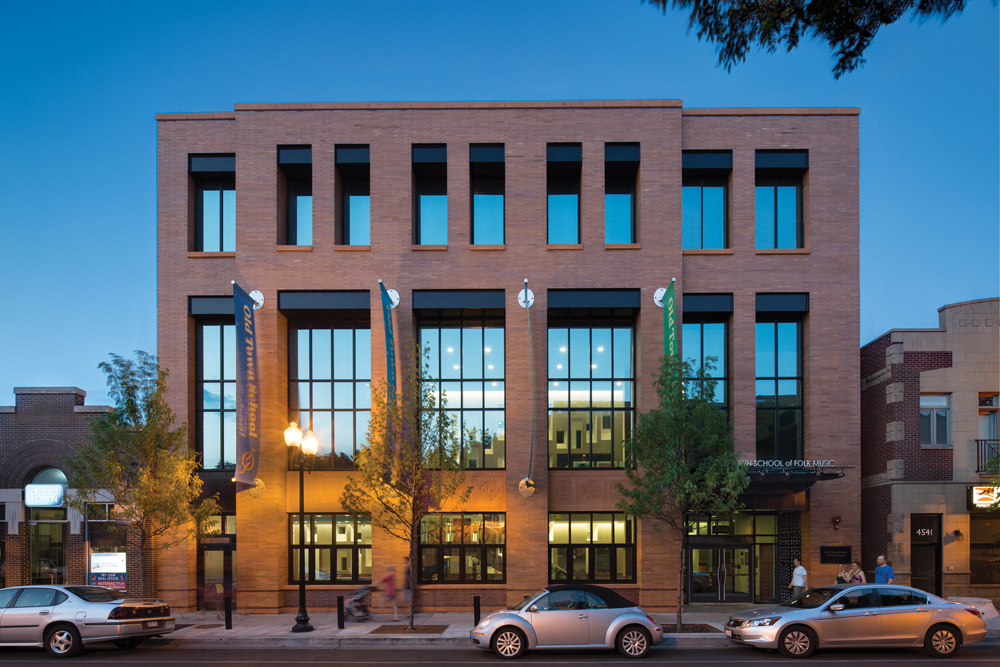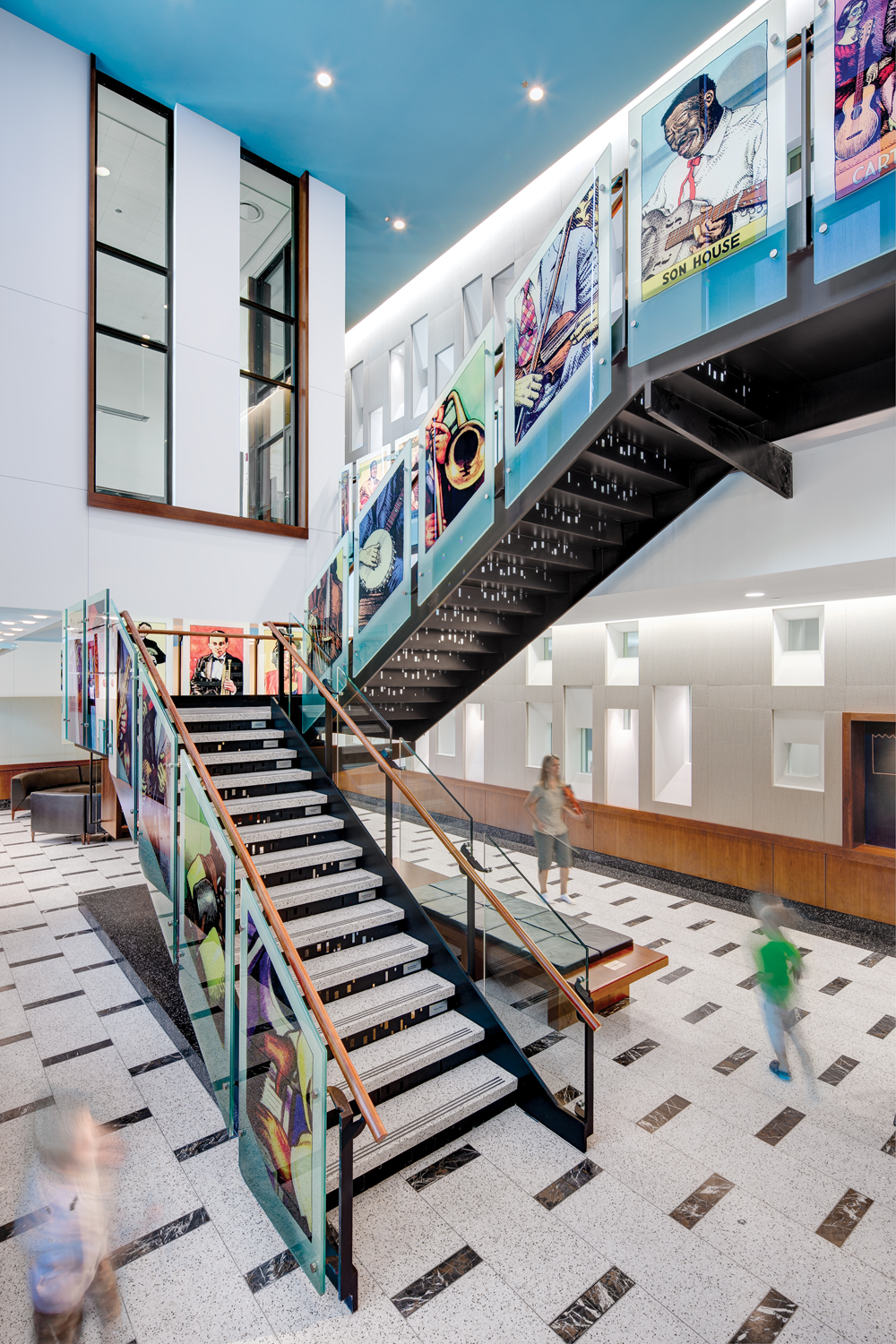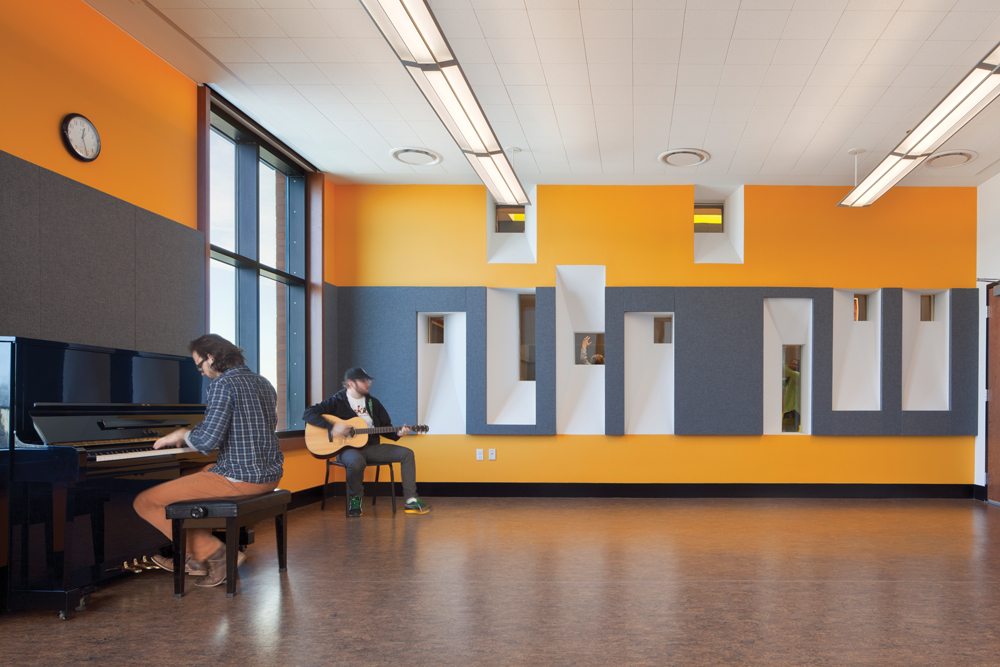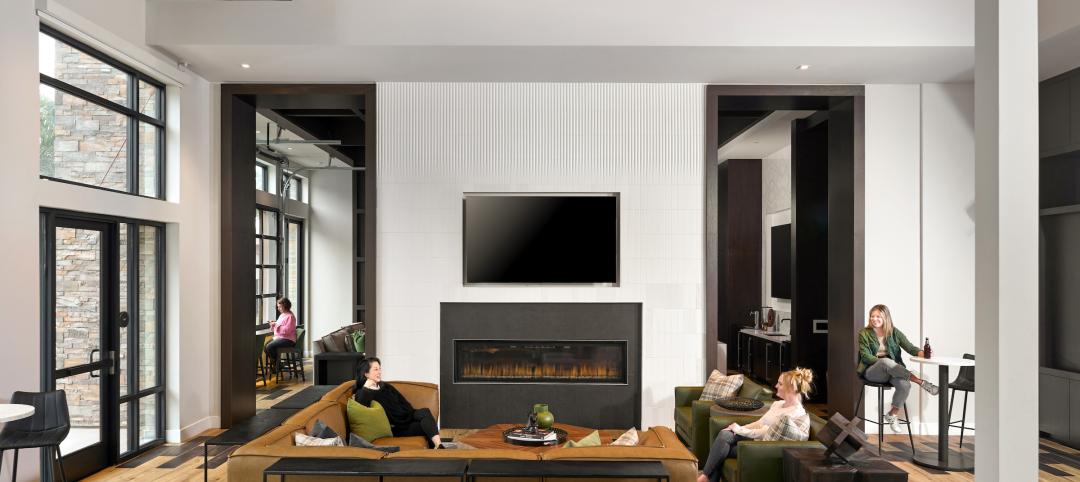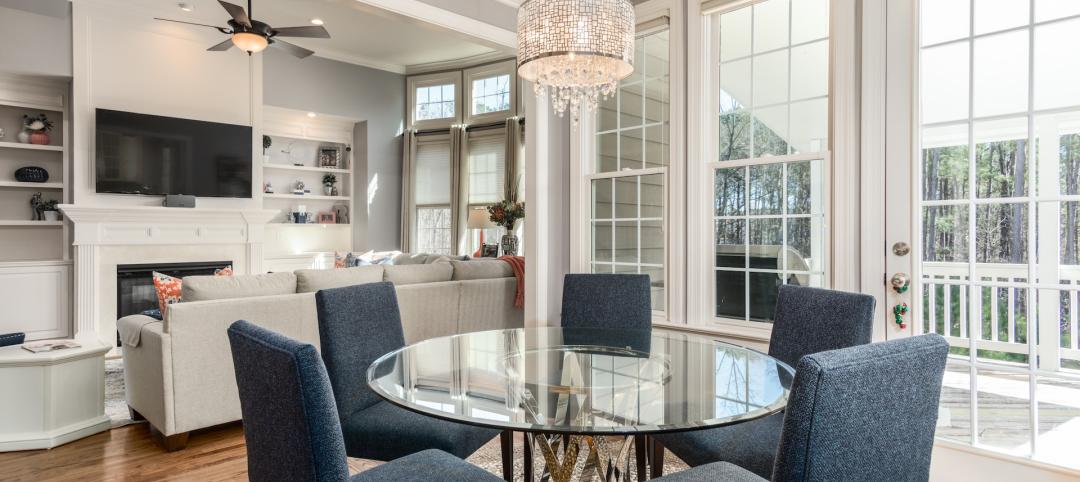Collaboration is fundamental to the mission of the Old Town School of Folk Music. Founded in 1957, the thriving Chicago nonprofit offers multicultural music, dance, theater, and visual arts courses and concerts, with users running the gamut from “Wiggleworm” tots to senior citizens. The school serves about 6,000 students a week, and performances attract 85,000 people annually. Pros often jam with rank beginners, reflecting a spirit of teamwork inspired by the institution’s folk roots.
Despite continuing success, OTS has always operated in reused buildings. Its current facilities include a 19th century banquet hall (renovated in the 1980s) and a 1930s library repurposed as the school’s headquarters in the late 1990s. When the school decided to squeeze its first purpose-built facility into a tight site across the street from its HQ, the Building Team’s collaborative skills proved a good match for the OTS vibe.
The new 28,000-sf East Building includes small spaces for music instruction and practice, a multipurpose hall for performances and parties, three skylit dance studios, and a public “front porch” entry hall. Because room-to-room sound leakage was a longstanding headache, excellent acoustics were a priority.
The open staircase, with stylized portraits of music legends, is the primary feature of the entrance lobby, or “front porch.” The multi-story “feature wall” creates acoustical separation between public areas and the music and dance classrooms, but interior windows maintain a sense of connection and distribute natural light. Soft seating invites informal jam sessions, and the terrazzo floor is studded with recycled beer bottles—a wry nod to the historic connection between music and libations.
The site, on a busy commercial avenue, posed significant issues that became more evident upon further investigation. The water table was high, and any excavation deeper than 11 feet would require tedious permitting through the city’s Office of Underground Construction. The proposed building height, though not unprecedented in the neighborhood, would violate recent zoning language created to prevent development of tall condo buildings.
These factors derailed initial plans to create a four-story facility with a basement. OTS and its architect, VOA Associates, deleted executive offices and storage from the program, resulting in a three-story, no-basement building plus a rooftop mechanical zone. (A return to earlier zoning language was negotiated to address the height restriction, and some of desired building functions were accommodated in a small storefront next to main OTS building.)
Bill Ketcham, AIA, LEED AP, Principal at VOA, says, “We didn’t lose anything that was mission-critical. Through a legitimate budgeting process we managed to maintain quality; I don’t think we were hurt very badly on the value enhancement.”
In addition to owner’s rep The AT Group, acoustical specialist Talaske was an early player. “We knew we needed a highly qualified acoustical consultant from day one, so we didn’t screw that up,” says Ketcham.
Seen from inside a music practice room, the feature wall consists of an inner layer that incorporates fire-rated glazing and fabric-covered acoustical panels, and an outer layer on the public circulation side, which includes glass-fiber-reinforced gypsum frames surrounding the windows. The walls are isolated from each other down to the foundation.
Bulley & Andrews was also hired early, in part because the construction manager had submitted a detailed analysis of how the project could be staged without snarling traffic. “This was quite compelling to us,” says Ketcham. “The building takes up the entire lot, and there’s no parking, so the plan was to frame out the front bay last to allow for staging within the building. Old Town does have a parking lot a couple doors down, and they worked out a plan to use that lot for staging, with the alley available for moving people and materials. Major deliveries were brought in the front during off hours. Lincoln Avenue is pretty congested, but most of the retailers there also do street loading. There was very good coordination with the alderman’s office and the local merchants.”
OTS Executive Director Bau Graves says, “We did community meetings prior to the start, and Bulley & Andrews’ superintendent on the site continually talked with everybody about everything going on. We also offered biweekly tours, and I know most of our neighbors went through at least once, and several more than once, during the construction.”
Notable features of the project include:
• Energy conservation. Operating costs were top-of-mind for OTS, in light of experiences with its headquarters project. The former library, considered sustainable at the time of its renovation with electric heat, had proved costly to operate once the local utility’s promotional rate lock expired. OTS selected natural gas and high-efficiency HVAC for the new LEED Gold building.
• Acoustical design. Robust steel framing and sophisticated isolation technology offer sound control. A full-height “feature wall,” punctuated with recessed slot windows, visually and acoustically separates the music and dance areas from the public lobby.
• Flexible space. Bleachers in Szold Hall, a 2,100-sf room on the second floor, can support 150 seats for concerts but fold back to open the column-free space for dance classes and receptions.
• Contextual design. The front façade echoes the Art Deco library with vertical windows and orange brick. Decorative precast concrete panels feature the word “music” in ancient and modern languages, recalling the library’s decorative terra cotta plaques. Side facades are primarily gray-painted steel: a plain, money-saving treatment that helps downplay the bulk of the building when viewed from the north or south.
Eighteen months after completion, Graves has nothing but praise for those who made the project a reality. “The Bulley & Andrews team, the VOA team, the owner’s rep, all the main players worked through a lot of issues that any job of this scale will represent, and did it with a great deal of tact and forbearance. People told me we’d never want to see our architect again after this kind of job, but we all ended up being good friends.”
Project summary
SILVER AWARD
Old Town School of Folk Music, East Building
Chicago
BUILDING TEAM
Submitting firm: VOA Associates (architect)
Owner: Old Town School of Folk Music
Owner’s rep: The AT Group
Structural: Matrix Engineering
MEP: Primera Engineers Ltd.
Civil: Gary A. Wiss
Acoustical: Talaske
CM: Bulley & Andrews LLC
GENERAL INFORMATION
Project size: 28,070 sf
Construction cost: $13 million
Construction time: Summer 2010 to fall 2012
Delivery method: CM at risk
Related Stories
MFPRO+ Special Reports | Oct 27, 2023
Download the 2023 Multifamily Annual Report
Welcome to Building Design+Construction and Multifamily Pro+’s first Multifamily Annual Report. This 76-page special report is our first-ever “state of the state” update on the $110 billion multifamily housing construction sector.
Giants 400 | Oct 23, 2023
Top 190 Multifamily Architecture Firms for 2023
Humphreys and Partners, Gensler, Solomon Cordwell Buenz, Niles Bolton Associates, and AO top the ranking of the nation's largest multifamily housing sector architecture and architecture/engineering (AE) firms for 2023, as reported in Building Design+Construction's 2023 Giants 400 Report. Note: This ranking factors revenue for all multifamily buildings work, including apartments, condominiums, student housing facilities, and senior living facilities.
Affordable Housing | Oct 20, 2023
Cracking the code of affordable housing
Perkins Eastman's affordable housing projects show how designers can help to advance the conversation of affordable housing.
Senior Living Design | Oct 19, 2023
Senior living construction poised for steady recovery
Senior housing demand, as measured by the change in occupied units, continued to outpace new supply in the third quarter, according to NIC MAP Vision. It was the ninth consecutive quarter of growth with a net absorption gain. On the supply side, construction starts continued to be limited compared with pre-pandemic levels.
Warehouses | Oct 19, 2023
JLL report outlines 'tremendous potential' for multi-story warehouses
A new category of buildings, multi-story warehouses, is beginning to take hold in the U.S. and their potential is strong. A handful of such facilities, also called “urban logistics buildings” have been built over the past five years, notes a new report by JLL.
Building Materials | Oct 19, 2023
New white papers offer best choices in drywall, flooring, and insulation for embodied carbon and health impacts
“Embodied Carbon and Material Health in Insulation” and “Embodied Carbon and Material Health in Gypsum Drywall and Flooring,” by architecture and design firm Perkins&Will in partnership with the Healthy Building Network, advise on how to select the best low-carbon products with the least impact on human health.
Contractors | Oct 19, 2023
Crane Index indicates slowing private-sector construction
Private-sector construction in major North American cities is slowing, according to the latest RLB Crane Index. The number of tower cranes in use declined 10% since the first quarter of 2023. The index, compiled by consulting firm Rider Levett Bucknall (RLB), found that only two of 14 cities—Boston and Toronto—saw increased crane counts.
Office Buildings | Oct 19, 2023
Proportion of workforce based at home drops to lowest level since pandemic began
The proportion of the U.S. workforce working remotely has dropped considerably since the start of the Covid 19 pandemic, but office vacancy rates continue to rise. Fewer than 26% of households have someone who worked remotely at least one day a week, down sharply from 39% in early 2021, according to the latest Census Bureau Household Pulse Surveys.
Luxury Residential | Oct 18, 2023
One Chicago wins 2023 International Architecture Award
One Chicago, a two-tower luxury residential and mixed-use complex completed last year, has won the 2023 International Architecture Award. The project was led by JDL Development and designed in partnership between architecture firms Goettsch Partners and Hartshorne Plunkard Architecture.
Giants 400 | Oct 17, 2023
Top 130 Sports Facility Architecture Firms for 2023
Populous, Gensler, HOK, and HKS head BD+C's ranking of the nation's largest sports facility architecture and architecture/engineering (AE) firms for 2023, as reported in Building Design+Construction's 2023 Giants 400 Report.


